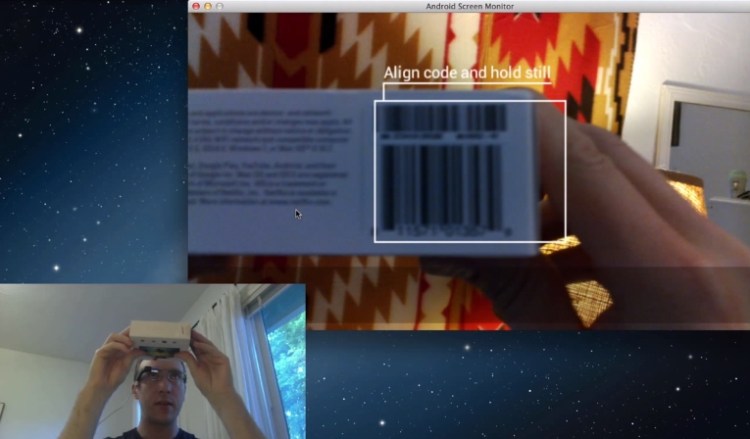I’ve accidentally walked into fellow shoppers and displays on several occasions because I was looking at my phone in a store. Developer Lance Nanek is working to make the in-store research process more graceful with an application for Google Glass.
Crystal Shopper is a barcode scanner and price-checker that presents the shopper with price comparisons and Amazon ratings. You can be in a store, or at a friend’s house, and quickly find out how much something costs. The price range is particularly useful for items like books, where the difference between a used paperback and a new hardcover are significant. The Glass wearer can save items for later that they want to buy.
Mobile devices now play a significant role in the brick-and-mortar retail experience. A study conducted by Google found that 84 percent of smartphone shoppers use their phones in a store. This is “transforming the in-store shopping experience” because customers can access contextual information about products right from their phone and make sure they are getting the best deals. Shoppers that use mobile spend 25 percent more in store than other customers, and this extends across categories ranging from appliances to baby care.
The information consumers pull up on their smartphone plays a major part in their purchasing decision. This presents huge opportunities for brands, marketers, retailers, and startups to build applications in response to this trend. Glass, however, could be the next frontier for connected commerce.
Google Glass is still in its early days. It is only under use from a small number of early adopters, there are few applications, and no centralized way to find or buy them. However, “wearables” is one of the hottest areas of computing right now, and excitement in the tech scene is running high for the possibilities.
Redg Snodgrass is the founder of Stained Glass Labs, an incubator program dedicated to the exploration and development of Glass technology.
“There is a lot of apprehension and negativity surrounding Glass, but it’s a lot like how people reacted when the iPhone first came out,” Snodgrass said in an interview. “Glass is a more natural fit for humanity than a smartphone because its integrated into our human environment. You can look up and engage with other people, and it’s a better way to interact with data in real life.”
Google Glass has the potential to provide consumers with significant value while shopping because it creates a more seamless way to do product research (that doesn’t involve walking headlong into mannequins). Crystal Glass was developed during the Breaking Glass hackathon which took place in San Francisco this past weekend.
Google and high profile Silicon Valley investors are calling on developers to write Glass apps of all kinds. Google recently made allusions to a “Google Boutique” that could be an app store for Glass apps and media, and Google Ventures, Kleiner Perkins Caufield & Byers, and Andreessen Horowitz created the Glass Collective program to accelerate the Google Glass ecosystem. There are exciting opportunities in industries as diverse as healthcare, social media, and of course, commerce.
Nanek also built an app called MedRed for Glass that documents notes and photos of medical patients, and VoiceBuyer for Amazon which lets you shop on Amazon using Glass.
VentureBeat's mission is to be a digital town square for technical decision-makers to gain knowledge about transformative enterprise technology and transact. Learn More

